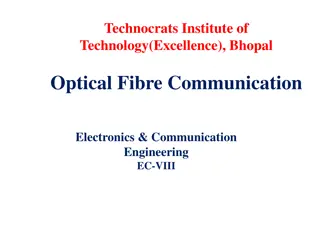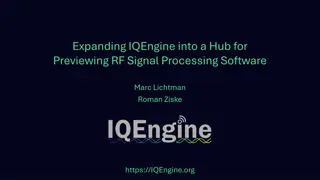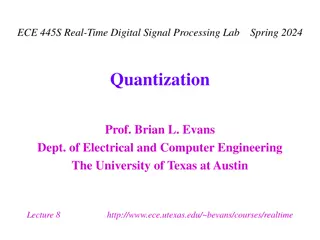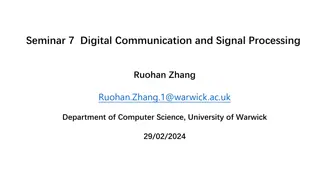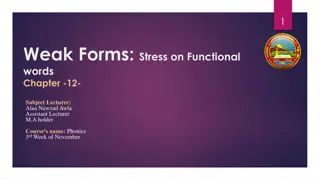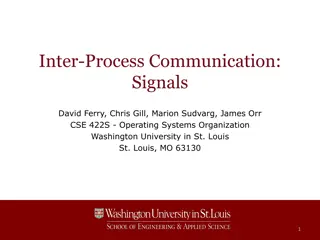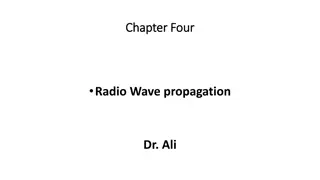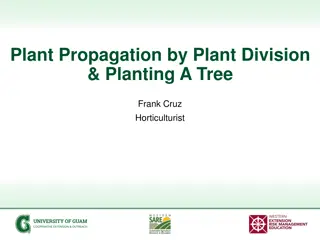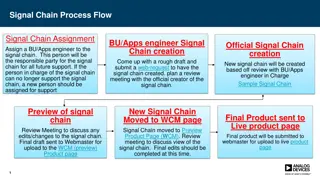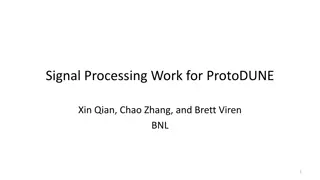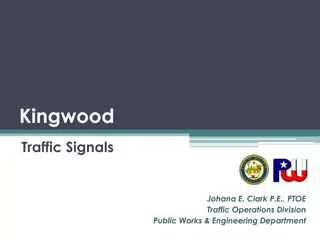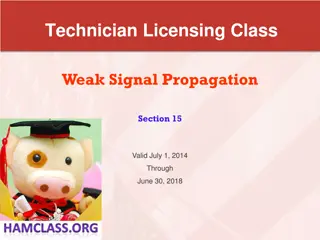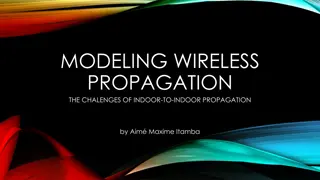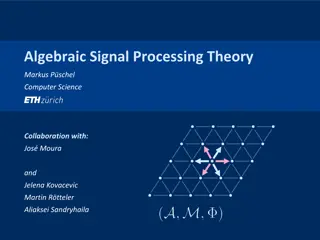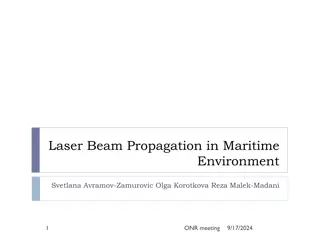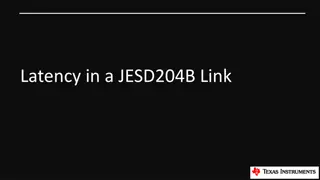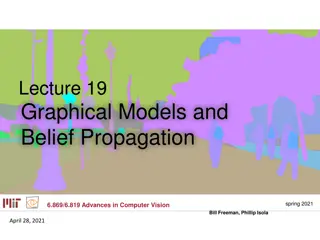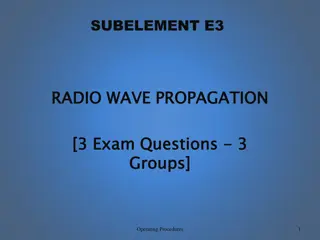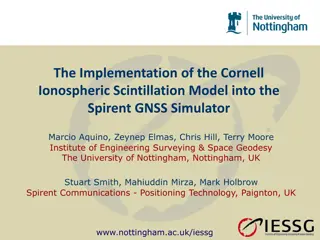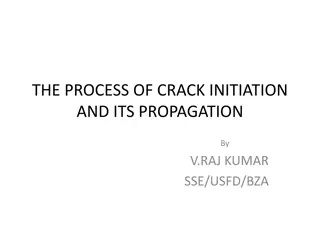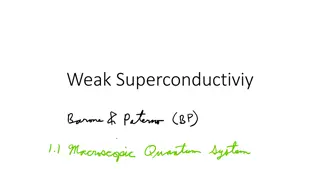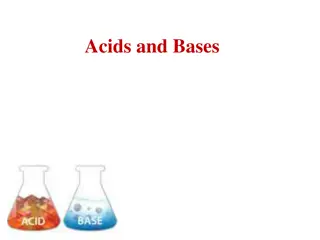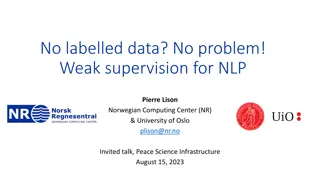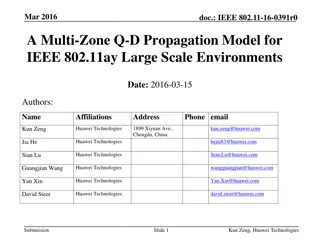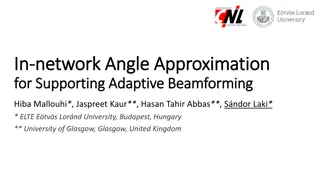Understanding Data Acquisition and Instrument Interface
In the realm of data acquisition and instrument interface, various components come together to sense physical variables, condition electrical signals, convert analog to digital data, and analyze the acquired information. This process involves transducers, signal analysis, instrument automation, and
3 views • 54 slides
Understanding Interpolation and Pulse Shaping in Real-Time Digital Signal Processing
Discrete-to-continuous conversion, interpolation, pulse shaping techniques, and data conversion in real-time digital signal processing are discussed in this content. Topics include types of pulse shapes, sampling, continuous signal approximation, interpolation methods, and data conversion processes
4 views • 14 slides
Understanding Optical Fiber Signal Degradation in Communication Engineering
Technocrats Institute of Technology (Excellence) in Bhopal delves into the concepts of signal degradation in optical fiber communication, focusing on attenuation, distortion mechanisms, and measurement techniques. The institute emphasizes the importance of signal attenuation and its impact on inform
4 views • 56 slides
Expanding IQEngine: A Hub for Previewing RF Signal Processing Software
IQEngine is evolving into a versatile hub where users can manage, analyze, process, and share RF signal recordings directly in their browser. Built on an open standard, IQEngine stores data such as sample rate, center frequency, and IQ data type to prevent data degradation. Frontend powered by React
7 views • 22 slides
Real-Time Digital Signal Processing Lab: Quantization and Resolution Overview
Explore quantization and resolution techniques in real-time digital signal processing. Topics include quantization error analysis, total harmonic distortion, noise immunity in communication systems, human sensory resolution, analog-to-digital conversion, and uniform amplitude quantization. Dive into
7 views • 19 slides
Seminar 7 Digital Communication and Signal Processing
Learn how to design a second order ARMA filter to suppress sinusoidal disturbances in a signal while preserving the original signal. The process involves deriving the transfer function, determining coefficients, and sketching a block diagram representation of the filter.
0 views • 7 slides
Understanding Strong and Weak Forms in English Pronunciation
Exploring the concept of strong and weak forms in English pronunciation, this content discusses the importance of using weak forms in speech, the rules of occurrence of strong forms, and how to recognize the position of weak forms. Examples and explanations illustrate how function words are weakened
1 views • 25 slides
Understanding Inter-Process Communication Signals in Operating Systems
Signals in inter-process communication are asynchronous notifications delivered to specific processes, allowing event-based programming. Processes can handle signal delivery by ignoring it, terminating, or invoking a signal handler. Signal handlers can be written in two ways - one handler for many s
0 views • 21 slides
Understanding Radio Wave Propagation in the Ionosphere
Radio wave propagation in the ionosphere is influenced by factors such as the radio refractive index and absorption of radio wave energy. This chapter delves into the interaction of radio waves with the ionosphere, discussing concepts like the electromagnetic spectrum nomenclature and the frequency
0 views • 15 slides
Understanding Buffer Solutions and pH Indicators
Buffer solutions resist changes in pH upon the addition of acids or bases, maintaining a stable pH level. They consist of a weak acid and its conjugate base or a weak base and its conjugate acid. pH indicators are weak acids or bases that exhibit color changes based on their degree of dissociation a
0 views • 21 slides
Plant Propagation Techniques and Tree Planting Guide
Learn various plant propagation methods such as division, bulbs and corms, tubers and rhizomes, along with essential tips for planting and care. Understand the processes of asexual propagation and division with detailed steps for successful plant propagation and growth. Discover how to propagate pla
0 views • 7 slides
Traffic Control and Coordination: Next Generation Signal Controller Overview
Explore the evolution of traffic signal controllers in Australia, from VC5 to VC6, along with the software integration and system overview. Learn about the hardware configurations and capabilities of the latest TSC/4 controllers, including signal group monitoring and conflict capabilities. The new g
4 views • 10 slides
Mastering the Art of Introducing Quotes with Signal Phrases
Understanding the importance of signal phrases in academic writing. Signal phrases provide context, establish credibility of sources, and prevent dropped quotes. Learn the key elements required for an effective signal phrase and how to structure them using different formulas. Enhance your writing by
1 views • 16 slides
Developing and Managing Signal Chains for Future Support
Create a system to assign a responsible person for signal chains, initiate the chain creation process, review and finalize the signal chain, and move it to the live product page. Guidelines include color codes for blocks, assigning part numbers to each block, and adding images to the signal chain.
1 views • 4 slides
Advancements in Signal Processing for ProtoDUNE Experiment
The team, including Xin Qian, Chao Zhang, and Brett Viren from BNL, leverages past experience in MicroBooNE to outline a comprehensive work plan for signal processing in ProtoDUNE. Their focus includes managing excess noise, addressing non-functional channels, and evolving signal processing techniqu
1 views • 23 slides
Comprehensive Training Package on Active Tuberculosis Drug Safety Monitoring and Management (aDSM) 2023
This training package focuses on signal detection in active tuberculosis drug safety monitoring. It covers the main aims and principles of signal detection, completion of safety profiles for new TB drugs and regimens, definition of signal, continuous reporting activities, construction of risk profil
5 views • 15 slides
Kingwood Traffic Signals Overview and Updates
Traffic operations in Kingwood, managed by Johana E. Clark, P.E., include signal system improvements and updates. Recent changes involve signal removal studies, new signal installations, and upgrades at key intersections to enhance traffic flow and safety. The system's capacity and daily traffic vol
1 views • 11 slides
Understanding HF Propagation and Solar Activity
Explore the basics of HF propagation, how solar activity influences band conditions, and the impact of phenomena like sunspots, flares, and CMEs. Learn which bands to use for effective communication and grasp the fundamentals of wave propagation, refraction, and reflection. This presentation provide
0 views • 30 slides
Understanding Weak Signal Propagation in Radio Waves
This informative content delves into weak signal propagation and its various aspects related to electromagnetic waves, particularly in the context of radio communication. It covers topics such as radio waves, radio horizon, knife-edge diffraction, tropospheric scatter mode, auroral reflection, and m
1 views • 37 slides
Adapting Contest Strategies for Declining Solar Cycle 24 and Solar Cycle 25 Precursors
As Solar Cycle 24 rapidly declines, preparations for the subsequent Solar Cycle 25 are crucial. Insights on weak solar activity, potentially weak Cycle 25, and the impact on contest strategies are discussed. Improved DX propagation, reliable openings, and signal strengths to Europe and Japan, amidst
0 views • 12 slides
Understanding HF Propagation for Amateur Radio Communication
Dive into the world of HF propagation and how signals travel from one point to another in amateur radio communication. Explore topics such as ionosphere basics, critical frequency, practical examples, and the importance of the F2 layer. Gain insights into launching waves, propagation prediction meth
0 views • 34 slides
Understanding Wireless Propagation Models: Challenges and Applications
Wireless propagation models play a crucial role in characterizing the wireless channel and understanding how signals are affected by environmental conditions. This article explores the different propagation mechanisms like reflection, diffraction, and scattering, along with the challenges and applic
1 views • 14 slides
Carnegie Mellon Algebraic Signal Processing Theory Overview
Carnegie Mellon University is at the forefront of Algebraic Signal Processing Theory, focusing on linear signal processing in the discrete domain. Their research covers concepts such as z-transform, C-transform, Fourier transform, and various signal models and filters. The key concept lies in the al
2 views • 40 slides
Understanding Vegetative Propagation in Flowering Plants
This content explores the concept of vegetative propagation in flowering plants, focusing on asexual reproduction, flower structure, and gamete formation. It covers topics such as types of vegetative propagation, reproductive mechanisms, and the advantages of this process. Readers can test their kno
0 views • 50 slides
Laser Beam Propagation in Maritime Environment Study
Investigation and comparison of laser beam propagation in maritime environments through field and laboratory experiments. The study examines the effects of real-life conditions such as temperature fluctuations, wind, and aerosols on laser light propagation. A basic field experiment at the US Naval A
0 views • 11 slides
Understanding Micropropagation: A Clonal Propagation Method
Micropropagation is a popular method for vegetative propagation in plants, providing genetically identical copies through aseptic tissue culture techniques. This technique allows for mass production of true-to-type plantlets in a short time, crucial for the commercial propagation of horticultural cr
0 views • 42 slides
Understanding Latency in JESD204B Links
Latency in a JESD204B link refers to the time it takes for a signal to travel from input to output, influenced by factors like system setup, device dependencies, clock propagation delays, and signal alignment. Definitions such as Sample-to-Serial Out (S2SO), Link Delay, and Link Latency are crucial
0 views • 46 slides
Understanding Strong and Weak Links in Team Talent Distributions
Talent distributions within sports teams can vary greatly, affecting team performance. The concepts of strong and weak links in team dynamics are explored through examples in hockey, shedding light on how having the best player or avoiding the worst player can impact outcomes. The correlation betwee
0 views • 13 slides
Graphical Models and Belief Propagation in Computer Vision
Identical local evidence can lead to different interpretations in computer vision, highlighting the importance of propagating information effectively. Probabilistic graphical models serve as a powerful tool for this purpose, enabling the propagation of local information within an image. This lecture
0 views • 50 slides
Understanding Radio Wave Propagation and Operating Procedures in Subelement E3
Explore the fascinating world of radio wave propagation, including topics such as Earth communications, meteor scatter, microwave propagation, aurora propagation, and various techniques like trans-equatorial propagation. Learn about the maximum separation between stations communicating by Moon bounc
1 views • 101 slides
Implementation of Cornell Ionospheric Scintillation Model in Spirent GNSS Simulator
Researchers from the University of Nottingham and Spirent Communications collaborated to implement the Cornell Ionospheric Scintillation Model into the Spirent GNSS Simulator. The study focuses on the diffractive effects of ionospheric scintillation on GNSS signals, examining small-scale plasma irre
0 views • 24 slides
Understanding Inter-Process Communication Signals in Operating Systems
Signals in operating systems play a critical role in facilitating asynchronous notifications between processes. They allow for event-based programming and are conceptually similar to hardware interrupts and exceptions. Processes can handle signal delivery by ignoring it, terminating, or invoking a s
0 views • 24 slides
Understanding the Process of Crack Initiation and Propagation
The process of crack initiation and propagation in materials is essential to comprehend for assessing fracture risk. This involves calculating defect sizes using fracture toughness values and understanding how cracks develop under repeated stresses, leading to fast fractures. The direction of crack
0 views • 36 slides
Understanding Weak Superconductivity and Functional Coordinates
Delve into the realm of weak superconductivity and the significance of functional coordinates in this informative presentation. Explore the intricacies of these concepts through a series of visually appealing slides that shed light on their characteristics and applications. Gain insights into the re
0 views • 8 slides
Understanding Acids and Bases: Ionization and Properties
Acids donate protons while bases accept them. Strong acids and bases ionize completely, while weak acids ionize partially. Water is amphoteric, capable of both accepting and donating protons. The equilibrium constant Kw for water is 10^-14. Understanding the ionization of weak acids and weak bases h
0 views • 15 slides
Understanding Acids and Bases in Chemistry: Key Concepts and Terminology
This chapter delves into the fundamental concepts of acids and bases in chemistry, covering Arrhenius, Bronsted-Lowry, and Lewis definitions. It discusses conjugate acids and bases, acid dissociation, dissociation of strong and weak acids, and the differences between strong and weak acids/bases. The
0 views • 41 slides
Weak Supervision for NLP: Overcoming Labelled Data Challenges
Addressing the challenge of acquiring labelled data for NLP models, weak supervision techniques offer solutions through alternative annotation methods and leveraging diverse data sources. This talk highlights the importance of overcoming the scarcity of labelled data in machine learning and NLP task
0 views • 18 slides
Multi-Zone Propagation Model for IEEE 802.11ay Large Scale Environments
The presentation by Huawei Technologies introduces a multi-zone propagation model for IEEE 802.11ay in large-scale scenarios operating in the 60 GHz band. It aims to address the diverse physical effects experienced by signals over long distances, complementing the existing Q-D channel model for more
0 views • 12 slides
Understanding Fast Fourier Transform (FFT) in Signal Processing
Fast Fourier Transform (FFT) is a powerful algorithm used in signal processing to efficiently calculate the Discrete Fourier Transform (DFT). This advanced technique leverages symmetry and periodicity properties to reduce computational complexity, making it a key tool in digital signal analysis. By
0 views • 14 slides
Beamforming in mmWave Transmission for 5G Networks
Adaptive beamforming plays a vital role in supporting mmWave transmission in 5G networks, addressing challenges like high propagation loss and signal blockage. The use of an innovative user-assisted approach, involving angle computation and configuration messages, enhances the beamforming process fo
0 views • 18 slides


